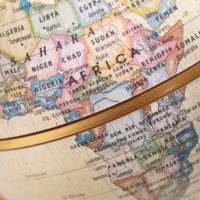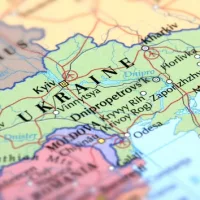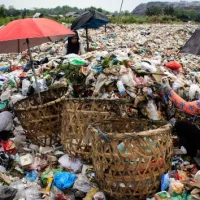
Anson_iStock/iStockBy MORGAN WINSOR, ABC News
(LONDON) — The reported death toll from COVID-19 in Africa surpassed 100,000 on Friday, as the world’s second-largest and second-most populous continent grapples with a fresh wave of infections.
Out of the more than 3.79 million confirmed cases of COVID-19 across the 54-nation continent, at least 100,294 people have died since the start of the pandemic, according to the latest data from the Africa Centers for Disease Control and Prevention.
“This pandemic is raging,” Dr. John Nkengasong, director of the Africa Centers for Disease Control and Prevention, said during a press briefing Thursday, as the death toll approached the 100,000 mark. “The mortality during the second wave has been very, very severe.”
The grim milestone came just over a year after Africa’s first confirmed case of COVID-19 was identified in Egypt on Feb. 14, 2020. The continent was praised for its early and swift response to the pandemic last year, with many African countries appearing to be spared from the first wave of infections seen elsewhere in the world. But that narrative has changed as testing rates ramp up and a more contagious variant of the novel coronavirus helps fuel a resurgence of cases.
“If anyone had told me one year ago that we as a continent within one year would be seeing 100,000 deaths from a new infection, I would probably not have believed that,” Nkengasong told reporters. “But here we are in that scenario.”
The continent of some 1.3 billion people accounts for 17% of the global population but only 3.5% of confirmed COVID-19 cases worldwide and 4% of the global death toll. However, Nkengasong said Africa’s case fatality rate is now at 2.6%, which remains higher than the global average of 2.2% and a noted increase from the continent’s 2.4% rate after the initial wave of infections. Twenty-one African nations also now have case fatality rates that are above the global average, according to Nkengasong.
So far, 34.6 million COVID-19 tests have been conducted in Africa, with an overall positivity rate of 10.9%. In the week ending on Feb. 14, there were 915,000 additional tests conducted continent-wide, a 14% increase compared with the previous week, according to Nkengasong.
The World Health Organization’s regional director for Africa, Dr. Matshidiso Moeti, told reporters last week that the continent’s COVID-19 death toll had increased by 40% in the last month, compared with the previous month, which equates to over 22,000 people dying in four weeks.
“The increasing deaths from COVID-19 are a tragic warning that health workers and health systems in many countries in Africa are dangerously overstretched,” Moeti said during a press briefing on Feb. 11.
The actual numbers are feared to be much higher, since most countries in Africa lack the means to track mortality data.
“We are definitely not counting all the deaths, especially in the second wave,” Nkengasong told reporters last week.
But the latest trend is “encouraging,” Nkengasong said Thursday. In the week ending on Feb. 14, Africa saw a 25% decrease in newly confirmed COVID-19 cases as well as a 28% drop in newly reported deaths from the disease, compared with the previous week. Moreover, between Jan. 18 and Feb. 14, there was an overall average decrease of 21% in new cases across the continent, according to Nkengasong.
One variant of the virus, known as 501Y.V2 or B.1.351, is now the dominant strain in hard-hit South Africa, accounting for about 90% of the country’s new cases. The highly infectious variant was first identified in South Africa in December and has since spread to 10 other African nations as well as numerous other countries around the world, according to Nkengasong.
International aid group Medecins Sans Frontieres (Doctors Without Borders) said Thursday that the situation in Southern Africa “is dire” as the variant “is spreading, further straining fragile health care systems,” and that equitable access to and distribution of vaccines “is more critical now than ever.”
South Africa, which accounts for about 40% of all confirmed cases on the continent, announced earlier this month that it would halt plans to vaccinate 15 million front-line health care workers with a COVID-19 vaccine developed by England’s University of Oxford and British-Swedish pharmaceutical giant AstraZeneca, following the publication of preliminary data that showed the two-dose shot provides only minimal protection against mild to moderate infection from the B.1.35 variant.
Instead, South Africa began inoculating those workers on Wednesday with a single-dose COVID-19 vaccine developed by American pharmaceutical giant Johnson & Johnson, which was shown to be 57% effective at preventing moderate to severe infection during a clinical trial in South Africa. The B.1.351 variant was responsible for 95% of cases in that study.
In global trials, the Johnson & Johnson vaccine was shown to be 85% effective at preventing severe infection and hospitalization, no matter the variant.
The COVAX Facility, a global initiative to ensure rapid and equitable access to COVID-19 vaccines for all countries regardless of income, said it aims to start shipping nearly 90 million doses to Africa this month in what will be the continent’s largest-ever mass vaccination campaign. The goal is to provide Africa with up to 600 million doses by the end of the year.
To complement those efforts, the African Union has secured 670 million doses for the continent which will be distributed in 2021 and 2022 as countries secure adequate financing.
The Africa Centers for Disease Control and Prevention has set a target of vaccinating at least 60% of the continent’s population against COVID-19.
“This is a phased approach,” Nkengasong told reporters Thursday. “If we really want to get ahead of this pandemic, we should strive to vaccinate 35% of our population by the end of the year.”
Copyright © 2021, ABC Audio. All rights reserved.















